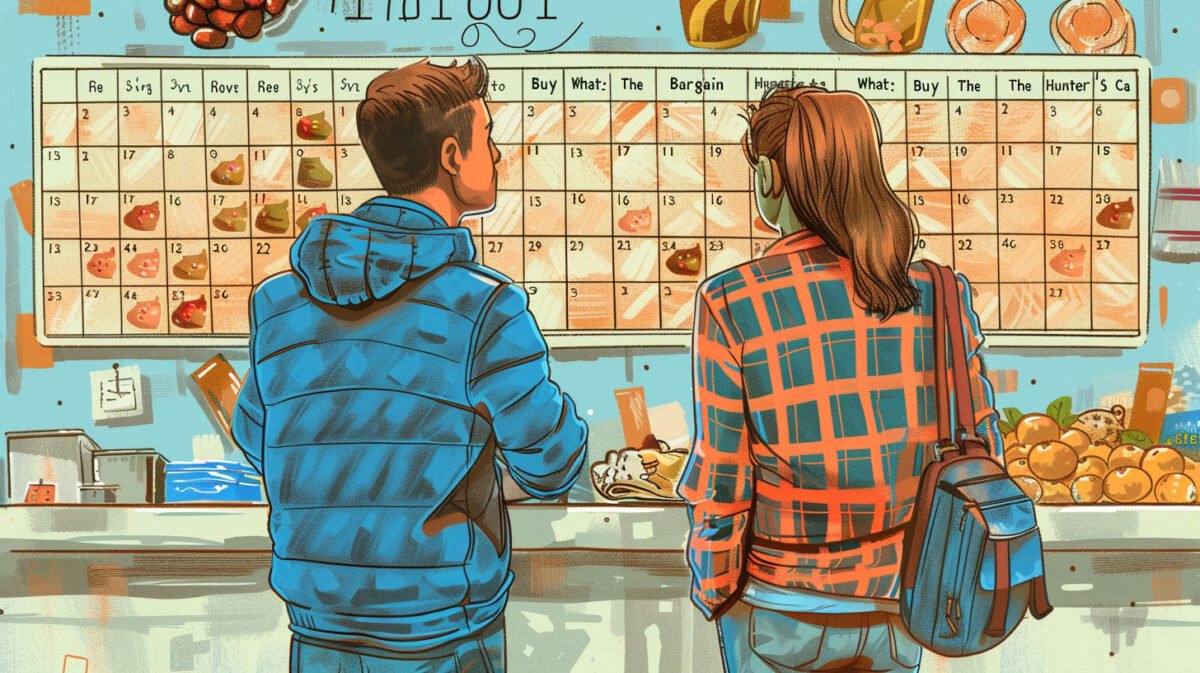
When to Buy What: The Bargain Hunter’s Calendar
Ever scored a 55-inch 4K TV for the price of a fancy dinner? Snagged a round-trip flight to Bali for less than your monthly coffee budget? Or maybe you’ve rocked a designer outfit that cost you mere pennies on the dollar? If you’re shaking your head, get ready to have your mind blown.
Welcome to the thrilling world of strategic shopping, where timing isn’t just everything – it’s the ONLY thing. In a world where we’re constantly bombarded with “limited-time offers” and “flash sales,” knowing when to buy can be the difference between paying full price and scoring an epic deal.

I’m not talking about clipping coupons or waiting for Black Friday. I’m talking about understanding the secret rhythms of the retail world, the hidden patterns that dictate when prices drop and deals emerge.
Think of it like surfing: You wouldn’t just paddle out into the ocean at any random time, right? You’d wait for the perfect wave, the one that’ll give you the ride of your life. Shopping is no different.
In this in-depth guide, we’re going to dive into the psychology of sales, the best times to buy everything from electronics to groceries, and even some insider tips that’ll make you a deal-hunting ninja. So buckle up, bargain hunters, because we’re about to embark on an adventure that’ll not only save you money but also turn shopping into an exhilarating game.
The Psychology of Sales & Discounts

Ever wondered why that “50% off” sign seems to scream at you from across the mall? Or why those “limited-time offers” make your heart race a little? Retailers aren’t just throwing these things out there randomly – they’re masters of psychology, carefully crafting strategies to trigger our deepest shopping instincts.
Here’s the deal: Retailers know that we’re emotional creatures. We’re drawn to things that feel scarce, exclusive, and urgent. So they use words like “limited stock,” “flash sale,” and “ending soon” to create a sense of FOMO (fear of missing out) that drives us to buy.
But it goes deeper than that. Ever noticed how many prices end in 9 or 99? That’s not a coincidence. It’s called “charm pricing,” and it works because our brains are wired to focus on the first number we see. A $9.99 item feels significantly cheaper than a $10 item, even though it’s only a penny difference.
And then there’s the “anchoring effect.” Retailers often show you the original price of an item next to the sale price. This makes the discount seem more impressive, even if the original price was inflated to begin with.
Exclusive Tip: Watch out for “decoy pricing.” This is when retailers offer three similar products at different price points to make the middle option seem like the best value. For example, a coffee shop might offer a small coffee for $2, a medium for $3.50, and a large for $4. This makes you more likely to buy the medium, even if you only wanted a small.
Understanding these tactics is the first step to becoming a savvy shopper. By recognizing how retailers try to manipulate our emotions, we can make more rational decisions and avoid impulse buys that we’ll later regret.
Best Times to Buy: A Comprehensive Guide

Alright, fellow bargain hunters, it’s time to get down to the nitty-gritty: when to pounce on those deals. This isn’t just about knowing when the big sales happen (although those are important too). It’s about understanding the unique rhythms of each product category and strategically timing your purchases to perfection.
Electronics
Think of electronics like athletes: they peak, and then their performance starts to decline. The best time to buy a new laptop, TV, or smartphone is typically a few months after a new model is released. That’s when the previous generation gets marked down to move inventory.
- Laptops & Desktops: Look for deals around back-to-school season (July-August) and Black Friday/Cyber Monday (November).
- TVs: Prime time for TV deals is January-February (after the Super Bowl) and spring (before new models are released).
- Smartphones: Aim for deals in the months following a major new release, typically in the spring or fall.
Worst time to buy: Right before or right after a new model is released, when prices are at their highest.
Travel
Want to jet off to exotic locales without emptying your wallet? It’s all about the “shoulder seasons.” These are the sweet spots between peak and off-peak travel times, when you can often find lower prices and fewer crowds.
- Shoulder Seasons: Typically fall in the spring (April-May) and fall (September-October) for many destinations.
- Weekdays vs. Weekends: Flights and hotels are often cheaper on weekdays compared to weekends.
- Last-Minute Deals: If you’re flexible, you can sometimes snag incredible last-minute deals, especially for cruises and vacation packages.
Worst time to buy: Holidays, school breaks, and peak season (usually summer).
Clothing & Fashion
Fashion is a fickle beast, but you can tame it with the right timing. The key is to shop out of season and look for end-of-season sales.
- End-of-Season Sales: Hit the stores in January/February for winter clearance and July/August for summer clearance.
- Sample Sales: These are secret weapons for fashionistas, offering deep discounts on designer pieces.
- Thrift Stores: Don’t underestimate the power of thrifting! You can find amazing deals on gently used clothing, especially if you shop during off-peak hours or weekdays.
Worst time to buy: Right when new collections are released, when prices are at their highest.
Home & Appliances

Furnishing your home or upgrading your appliances can be a major investment, but it doesn’t have to break the bank. By timing your purchases strategically, you can score serious savings on everything from refrigerators to sofas.
- Scratch-and-Dent Sales: These are goldmines for appliance deals. Retailers often offer deep discounts on items with minor cosmetic imperfections that don’t affect functionality.
- Open-Box Deals: Another hidden gem! These are returned or floor model items that are typically sold at a significant discount.
- Holiday Weekends: Major appliances often go on sale around holiday weekends like Memorial Day, Labor Day, and Black Friday.
- End-of-Season Sales: Look for deals on patio furniture in the fall and indoor furniture in the late winter or early spring.
- Home Improvement Sales: Major home improvement retailers often have sales events throughout the year, so keep an eye out for those.
Unique Tip: If you’re not picky about brands or specific models, consider shopping at liquidation stores or outlet malls. You can often find brand-new appliances and furniture at a fraction of the retail price.
Worst time to buy: When new models are released or during peak home buying season (spring/summer).
Groceries

Yes, even grocery shopping has a rhythm! By syncing your trips with store restocking schedules, you can snag fresher produce and potentially score discounts on items nearing their sell-by date.
- Weekday Mornings: This is often when stores restock their shelves, so you’ll find the freshest selection.
- Wednesday or Thursday: Many stores release their weekly flyers and start new promotions on these days.
- Late Afternoon/Early Evening: This is when stores often mark down perishable items like baked goods and meat to avoid waste.
Unique Tip: Some supermarkets have a “manager’s special” section where they discount items that are close to their sell-by date but still perfectly good to eat. Check this section regularly for hidden gems!
Worst time to buy: Weekends, when stores are crowded and less likely to have markdowns.
Cars

Buying a car is a big deal (pun intended), so you want to make sure you’re getting the best possible price. Timing plays a crucial role in this high-stakes game.
- End of the Month/Quarter/Year: Salespeople often have quotas to meet, so they might be more willing to negotiate at these times.
- Weekdays vs. Weekends: Dealerships are typically less busy on weekdays, giving you more leverage in negotiations.
- Model Year-End: When new models arrive, dealers are eager to clear out the previous year’s inventory, often offering significant discounts.
Unique Tip: Consider buying a car in December. Sales tend to be slower during the holidays, and dealers might be more desperate to make a deal.
Worst time to buy: Spring and early summer, when demand is high and prices are at their peak.
Advanced Strategies for Deal Hunters

So, you’ve mastered the basics of timing and psychology. Now it’s time to level up your deal-hunting game with some advanced strategies that’ll make you the envy of even the most seasoned bargain shoppers.
Cashback & Rewards Programs
Don’t leave money on the table! Many credit cards and online platforms offer cashback or rewards programs that can add up to significant savings. Some even offer bonus rewards for specific categories like travel or dining.
Pro Tip: Stack your discounts by combining cashback rewards with coupons, sales, or promotional offers. It’s like a symphony of savings!
Price Error Alerts
Ever wished a store would accidentally put a decimal point in the wrong place? Well, sometimes they do! Several websites and online communities specialize in tracking down pricing errors and alerting their members.
Pro Tip: Sign up for price error alerts and be ready to pounce when a too-good-to-be-true deal pops up. These deals usually don’t last long!
Outlet Malls & Liquidation Stores
These hidden gems are often overlooked, but they can be treasure troves for bargain hunters. Outlet malls offer discounted prices on previous-season or overstock items from major brands, while liquidation stores sell merchandise from retailers that are going out of business.
Pro Tip: Be prepared to dig through some clutter, but the rewards can be worth it. You might find brand-name clothing, furniture, or electronics at a fraction of the retail price.
Negotiation Tactics: Haggling Like a Pro
Negotiation isn’t just for car dealerships. You can often haggle for better prices on everything from furniture to electronics. The key is to be confident, polite, and armed with information.
Pro Tip: Research prices beforehand, highlight any flaws or imperfections in the item, and don’t be afraid to walk away if you’re not getting a good deal. Sometimes, the threat of losing a sale is all it takes to get a better offer.
Case Studies & Real-Life Examples
Let’s face it, theory is great, but nothing beats seeing real-life results. So, here’s a story from my own deal-hunting adventures:
Last year, I was itching for a new laptop. But being the savvy shopper that I am, I didn’t just rush out and buy the first one I saw. Instead, I did my research, tracked prices, and waited patiently. My patience paid off in a big way during Black Friday when I snagged a top-of-the-line model for 40% off its original price. The feeling of victory was almost as sweet as the money I saved!
But it doesn’t stop there. I’ve scored ridiculously cheap flights to Europe by booking during the shoulder season, furnished my entire apartment with open-box deals, and even snagged a designer handbag for a song at a sample sale. These aren’t just flukes; they’re the result of knowing when and where to look for deals.
Your Turn: Have you ever scored an epic deal by timing your purchase just right? Share your story in the comments below! We’d love to hear about your bargain-hunting triumphs and learn from your experiences.
Conclusion
Congratulations, deal hunters! You’ve now unlocked the secrets of strategic shopping. You understand the psychology behind sales, you know the optimal times to buy various products, and you’re armed with advanced strategies to maximize your savings.
Remember, timing isn’t just about saving money – it’s about taking control of your spending and making informed decisions. It’s about the thrill of the hunt, the satisfaction of outsmarting the system, and the joy of scoring a deal that makes you feel like a champion.
So go forth, my fellow bargain seekers, and conquer the world of shopping! With the knowledge and skills you’ve gained from this guide, there’s no limit to what you can achieve. And who knows, you might even discover that shopping can be an exciting adventure, not just a chore.
FAQs
Are there any “secret” times to shop that most people don’t know about?
Yes! Beyond the well-known sales periods, there are hidden gems like scratch-and-dent sales for appliances, sample sales for fashion, and even specific days when grocery stores restock and offer discounts. This article dives into these lesser-known opportunities.
How can I predict when a specific item I want will go on sale?
While it’s not an exact science, you can use price-tracking tools and browser extensions to monitor price fluctuations. Additionally, understanding the typical sales cycles for different product categories (as outlined in this article) can help you anticipate potential discounts.
Do different stores have their own best times to shop?
Yes! Individual stores may have unique restocking schedules, promotional calendars, or clearance events. Pay attention to your favorite stores’ email newsletters and social media posts for announcements and insider tips.
Is it always better to wait for a sale, or are there times when it’s okay to buy at full price?
If you need an item urgently or it’s a limited-edition product, it might be worth paying full price. However, for most purchases, patience and strategic timing can lead to significant savings. Weigh the urgency of your need against the potential for future discounts.
How can I avoid impulse buying during sales, even when the deals seem too good to pass up?
Set a budget beforehand and stick to it. Make a list of the items you actually need and avoid browsing for things you don’t. Remember, a discount isn’t a good deal if you didn’t need the item in the first place.
Are online deals different from in-store deals?
Yes, sometimes. Online retailers may have different sales cycles or exclusive online-only promotions. However, many of the same principles apply, such as shopping during off-peak hours or utilizing cashback programs.
Can I negotiate prices even if a store doesn’t explicitly allow it?
It never hurts to try! While some stores have strict pricing policies, others may be open to negotiation, especially for high-ticket items or items with slight imperfections. Be polite, prepared, and don’t be afraid to walk away if you’re not getting a fair deal.
What are some reliable resources for finding deals and coupons?
Several websites and communities specialize in curating deals and coupons. You can also sign up for email newsletters from your favorite retailers and follow them on social media for exclusive offers.
Are there any ethical considerations when it comes to deal-hunting?
Yes, it’s important to be mindful of the impact of your shopping habits. Avoid overconsumption, prioritize sustainable and ethical brands, and consider donating or reselling items you no longer need instead of throwing them away.
Is deal-hunting worth the effort?
Absolutely! The thrill of scoring a great deal is undeniable, but the real reward is the financial freedom and peace of mind that comes with saving money. By mastering the art of timing, you can make your money go further and achieve your financial goals faster.

Hey everyone! Ben here. If there’s a deal out there, I’ll find it. Some call it an obsession, I call it a superpower. When I’m not scoring you amazing discounts, you might find me rock climbing or trying the spiciest food in town.